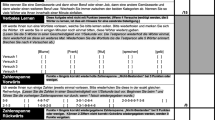Abstract
Cerebellar cognitive affective syndrome (CCAS) is characterized by deficits in executive functions, language processing, spatial orientation, and affect regulation in patients with cerebellar disease. The symptoms can occur isolated or along with motor and coordination symptoms. The aim of our study was to translate and culturally adapt the CCAS scale to Brazilian Portuguese and validate the scale in our population. We performed a cross-sectional study with patients with primary and secondary ataxia. The study included 111 individuals, aged between 20 and 80 years, of both genders, 20 without cognitive and/or affective complaints who participated in the pre-test phase, 40 with cerebellar disease (hereditary/neurodegenerative ataxia or acquired/secondary cerebellar ataxia), and 51 healthy controls with no evidence of cognitive impairment and no affective symptoms matched for sex, age, and educational level. The scale was translated, culturally adapted, and validated. Statistical analysis of the data was performed, with association tests, mean comparison, and ROC curve analysis. Based on the analysis of the ROC curve, optimal cutoff values were found for each subitem of the scale. The translated and adapted scale has good internal consistency, is reproducible, has good reliability, and has the potential to be a reliable tool for screening cognitive symptoms in patients with cerebellar disease.












Similar content being viewed by others
Change history
30 May 2022
A Correction to this paper has been published: https://doi.org/10.1007/s12311-022-01423-2
References
Schmahmann JD, Sherman JC. The cerebellar cognitive affective syndrome. Brain [Internet]. 1998;121:561–79. Available from: https://doi.org/10.1016/j.bandl.2009.07.006
Hoche F, Guell X, Vangel MG, Sherman JC, Schmahmann JD. The cerebellar cognitive affective/Schmahmann syndrome scale. Brain. 2018;141(1):248–70.
Ziad S. Nasreddine, Phillips NA, Valerie Bédirian, Charbonneau S, Whitehead V, Collin I, et al. The Montreal Cognitive Assessment, MoCA: A Brief Screening Tool For Mild Cognitive Impairment. J Am Geriatr Soc. 2005;(53):695–9.
Folstein MF, Folstein SE, McHugh PR. “Mini-mental state” a practical method for grading the cognitive state of patients for the clinician. J Psychiatry. 1975;12:189–98.
Schmahmann JD. The cerebellum and cognition. Neurosci Lett [Internet]. 2019;688(April):62–75. Available from: https://doi.org/10.1016/j.neulet.2018.07.005
Naeije G, Rai M, Allaerts N, Sjogard M, De Tiège X, Pandolfo M. Cerebellar cognitive disorder parallels cerebellar motor symptoms in Friedreich ataxia. Ann Clin Transl Neurol. 2020;7(6):1050–4.
Memória CM, Yassuda MS, Nakano EY, Forlenza OV. Brief screening for mild cognitive impairment: validation of the Brazilian version of the Montreal cognitive assessment. Int J Geriatr Psychiatry. 2012
Gottwald B, Wilde B, Mihajlovic Z, Mehdorn HM. Evidence for distinct cognitive deficits after focal cerebellar lesions. J Neurol Neurosurg Psychiatry. 2004;75(11):1524–31.
Guell X, Gabrieli JDE, Schmahmann JD. Triple representation of language, working memory, social and emotion processing in the cerebellum: convergent evidence from task and seed-based resting-state fMRI analyses in a single large cohort. Neuroimage. 2018;172:437–49.
Maeshima S, Osawa A, Maeshima E, Shimamoto Y, Sekiguchi E, Kakishitas K, et al. Usefulness of a cube-copying test in outpatients with dementia. Brain Inj. 2004;18(September):889–98.
Palmqvist S, Hansson O, Minthon L, Londos E. Current topics in management for evaluating treatment of Alzheimer’s disease. Am J Alzheimer’s Dis Other Dementias. 2008;23(5):439–46.
Argyropoulos GPD, van Dun K, Adamaszek M, Leggio M, Manto M, Masciullo M, et al. The Cerebellar Cognitive Affective/Schmahmann Syndrome: a Task Force Paper. Cerebellum. 2020;19(1):102–25.
Stoodley CJ, Schmahmann JD. The cerebellum and language: evidence from patients with cerebellar degeneration. Brain Lang [Internet]. 2009;110(3):149–53. Available from: https://doi.org/10.1016/j.bandl.2009.07.006
Schmahmann JD, Sherman JC. The cerebellar cognitive affective syndrome. Brain. 1998;121(4):561–79.
Koziol LF, Budding D, Andreasen N, DÁrrigo S, Bulgheroni S, Imamizu H, et al. Consensus Paper: The cerebellum’s role in movement and cognition. Cerebellum. 2014;13(1):151–77.
Hoche F, Guell X, Vangel MG, Sherman JC, Schmahmann JD. The cerebellar cognitive affective/Schmahmann syndrome scale. Brain. 2017;141(1):248–70.
Gordon N. Speech, language, and the cerebellum. Eur J Disord Commun. 1996;31:359–67.
Maas RPPWM, Killaars S, van de Warrenburg BPC, Schutter DJLG. The cerebellar cognitive affective syndrome scale reveals early neuropsychological deficits in SCA3 patients. J Neurol [Internet]. 2021;268(9):3456–66. Available from: https://doi.org/10.1007/s00415-021-10516-7
Hoche F, Guell X, Sherman JC, Vangel MG, Schmahmann JD. Cerebellar contribution to social cognition. Cerebellum. 2016;15(6):732–43.
Thieme A, Roeske S, Faber J, Sulzer P, Minnerop M, Elben S, et al. Validation of a German version of the Cerebellar Cognitive Affective/Schmahmann Syndrome Scale: preliminary version and study protocol. Neurol Res Pract. 2020;2(1).
Thieme A, Röske S, Faber J, Sulzer P, Minnerop M, Elben S, et al. Reference values for the Cerebellar Cognitive Affective Syndrome Scale: age and education matter. Brain. 2021;144(2):e20.
Rodríguez-Labrada R, Batista-Izquierdo A, González-Melix Z, Reynado-Cejas L, Vázquez-Mojena Y, Sanz YA, et al. Cognitive decline is closely associated with ataxia severity in spinocerebellar ataxia type 2: a validation study of the Schmahmann Syndrome Scale. Cerebellum. 2021;(0123456789).
Acknowledgements
We would like to thank Dr. Jeremy D. Schmahmann for his contribution to our study.
Funding
The author PB-N received funding from the Brazilian National Council for Scientific and Technological Development (CNPq) as research grant funding (Productivity scholarship).
Author information
Authors and Affiliations
Contributions
All authors contributed to the study conception and design. Material preparation, data collection, and analysis were performed by SSdOS, JLP, VVE, ESTS, MPdA, NAFF, and PB-N. The first draft of the manuscript was written by SSdOS and all authors commented on previous versions of the manuscript. All authors read and approved the final manuscript.
Corresponding author
Additional information
Publisher's Note
Springer Nature remains neutral with regard to jurisdictional claims in published maps and institutional affiliations.
Supplementary Information
Below is the link to the electronic supplementary material.
Supplementary file1
Supplement 3 is the final version of Brazilian Portuguese Cerebellar Cognitive Affective/Schmahmann syndrome scale (Version 1A). Supplements 4 through 6 are alternative versions of the Brazilian Portuguese of the scale, described as Version 1B, 1C and 1D respectively. (DOCX 12.1 MB)
Rights and permissions
About this article
Cite this article
de Oliveira Scott, S.S., Pedroso, J.L., Elias, V.V. et al. Translation, Cross-Cultural Adaptation, and Validation to Brazilian Portuguese of the Cerebellar Cognitive Affective/Schmahmann Syndrome Scale. Cerebellum 22, 282–294 (2023). https://doi.org/10.1007/s12311-022-01391-7
Accepted:
Published:
Issue Date:
DOI: https://doi.org/10.1007/s12311-022-01391-7




